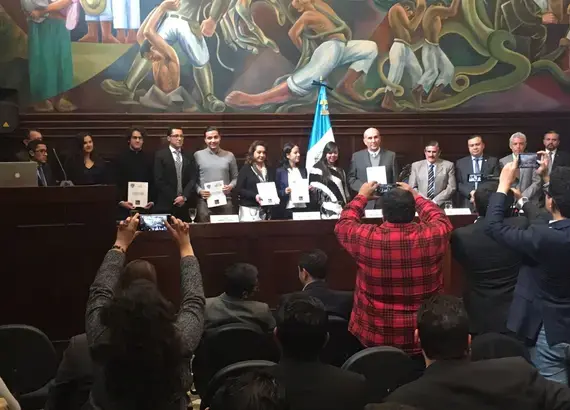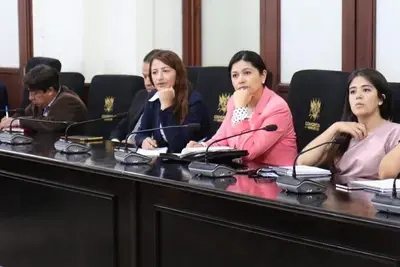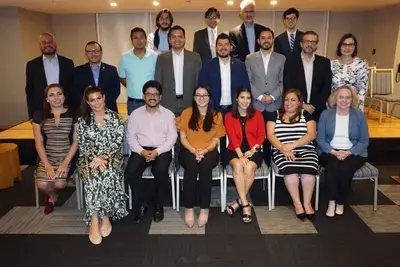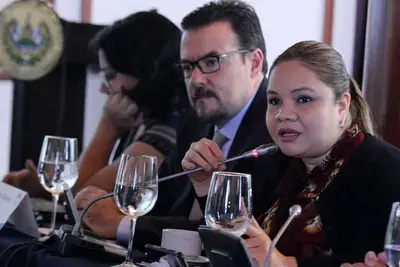
Members of Congress and civil society organizations publicly present Guatemala’s first Open Parliament Action Plan.
Success Story
Guatemalan Congress Passes Open Parliament Action Plan
To address root causes of endemic corruption that sparked massive protests in 2015 and strengthen a pillar of Guatemalan democracy, civil society organizations are working to make their country’s legislative branch of government more open, accountable and accessible to citizens. A significant step was taken in this regard on January 10, when the country’s Congress and a coalition of Guatemalan civic organizations publicly presented the Open Parliament Action Plan, a consensus roadmap for boosting internal and public transparency.
The Action Plan was developed in a participatory process that included representatives from Congress and the Alliance for an Open Congress (ACAG), a coalition of eight local, non-governmental parliamentary monitoring organizations. Member organizations and Congress held working sessions, which NDI helped facilitate, to create the Action Plan and ensure that it addressed government and civil society priorities. These dialogues resulted in five Congressional commitments to:
- Produce and publish legislative information, including the legislative calendar, congressional bulletins, and daily schedules, in open data formats to increase its utility by legislative and other government entities, journalists, academics, parliamentary monitoring organizations (PMOs) and concerned citizens;
- Train staff on open government, legislative transparency policies and procedures to help ensure they are put into practice;
- Make professional information about legislative staffers public, such as their names and curriculum vitae, to prove and illustrate their qualifications;
- Improve procedures for legislative accountability and citizen participation, including through digital tools and in-person sessions, to provide civil society a space for interaction and discussion during policy debates and greater access to information in order to conduct civic oversight; and
- Publish information on legislative affairs more proactively and in more engaging and interactive formats to improve citizens’ understanding of Congress’ functions.
The Action Plan’s significance extends globally and regionally – it is only the fourth of its kind in Latin America and the seventh in the world, including action plans from Chile and Georgia. The plan also provides a clear response to high-profile corruption scandals that shocked Guatemala in 2015 and 2016, ultimately leading to the resignation and arrest of the president, vice president and other senior officials. There are currently more than 300 open investigations into corruption in Guatemala. The cases exacerbated widespread citizen mistrust of the government and helped lead to the surprise election of an outsider candidate and current president, Jimmy Morales, who based his campaign on an anti-corruption platform. Still, the first year of Morales’ presidency has not been free from corruption allegations, which have implicated his family members and vice president. As old cases continue and new cases arise, citizens have emerged to demand greater transparency and accountability in all branches of government.
"Congress is one of the most important institutions in a representative democracy," said Gabriela Ayerdi, a representative from ACAG member organization Citizen Action (Acción Ciudadana), who was one of the presenters of the Action Plan with Congress and ACAG on January 10. "We recognize and applaud the progress made by the current congressional governing board regarding institutional transparency and access to public information."
The Open Parliament Action Plan is unique not only in its standing as one of the only of its kind in the world, but also in its promotion of relationships between civil society organizations and the Congress. Traditionally, these sectors of Guatemalan society have had a tense relationship. The renewed commitment to bridge this gap and encourage dialogue between civil society organizations and the Congress is one of the many steps taken towards improving relations between Guatemala’s citizenry and the government as a whole. According to Ayerdi, “Congressional leaders have shown greater willingness to work with citizens, recognizing the principles of open government as a tool to leverage citizen demands to make structural changes in our systems.” The Action Plan was also launched amidst a transition of power between presidents of Congress from different parties, but has been adopted by both, signaling strong cross-party support for the plan and principles of open parliament.
To support the Action Plan’s development, NDI facilitated exchanges with experts from across the region to inform the commitments and draw from other countries’ experiences. The focus of the legislature and ACAG now turns to the challenging process of implementing the plan and its individual provisions. “It will be crucial for civil society organizations and citizens to remain involved to ensure the success of implementing the plan’s short term goals and its long term viability,” said Eduardo Núñez, NDI’s Senior Country Director in Guatemala. “They must also raise awareness of this initiative so that more citizens are better able to stay informed of legislative affairs and take interest in actions to strengthen Congress, in turn improving congressional oversight and policy development processes, which are key to protecting citizens’ rights in Guatemala.”
Guatemala’s efforts to develop a legislative openness action plan were inspired in part by the Open Government Partnership (OGP), an international initiative with more than 70 member countries. OGP members are required to work closely with domestic civil society groups to develop a two-year National Action Plan. In partnership with the Congress of Chile, NDI serves as co-chair of the OGP Legislative Openness Working Group, which provides participating legislatures with technical assistance and opportunities for peer learning and exchange. In recognition of the importance of legislative openness, OGP recently passed a new legislative engagement policy that clears the way for a more formal role for legislatures in the national OGP process.
NDI’s assistance to the Guatemalan Congress on the Open Parliament Action Plan is funded by the Swedish International Development Cooperation Agency through the United Nations Office for Project Services.



